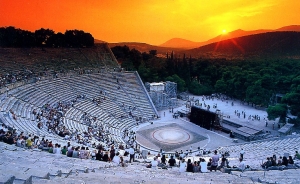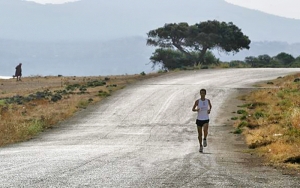XpatAthens
Epidavros – A Quick Day-Trip from Athens
Amidst the blue of the Saronic Gulf, well protected on its own smaller gulf, where the scent from the valley's orange blossoms meets the sea breeze in its picturesque friendly port, Ancient Epidavros, traditional yet modern, both tranquil and cosmopolitan, is always ready to welcome travelers whatever the season. Midway along the east coast of the Argolida district, easy to reach by highway via the Corinth Canal, the little town is built on the site of the ancient city-state of Epidavros.
Quiet pleasant people, occupied in fishing, tending orange groves and tourism, a mild climate, beautiful surroundings and a sound infrastructure provide the framework for all that one needs for a quick get-away from Athens.
Its sheltered location and natural surroundings, the beauty of the landscape and fertility of the soil, attracted not only men but also gods. It was here that Asklepios' most splendid sanctuary was situated. Here yet another important nucleus of ancient Greek civilization was created.
Some History
The first inhabitants of the area were the Carians and then later the Dorians. The city took part in the Trojan War; it fought against the Persians at Plataea and Salamis and found itself on the side of the Spartans in the Peloponnesian War. Good sailors and merchants, the people of Epidavros founded colonies and raised their town to a high level. Their civilization came to light during excavations on the peninsula that bisects the Bay of Epidavros, the "island" as the locals call it today.
We can find remains from the Acropolis with Roman walls, ruins of a palace and houses, columns from the Doric temple and nearby, Mycenaean tombs; while under the sea, not very deep, lies a section of the ancient city. Its jewel however can be found on the west side of the peninsula: the ancient theatre, or the "little one”, as it has been dubbed, to distinguish it from the "big one” in the Sanctuary of Asklepios. Built in the 4th century BC, it was dedicated to Dionysos, but for centuries remained buried under six meters of earth. In 1971, archaeologists began their digs. And today, elegant with its stone seats, it not only reaffirms the achievements of ancient civilization it also plays host to marvelous concerts.
Some Ancient History
Epidaurus was independent of Argos and not included in Argolis until the time of the Romans. With its supporting territory, it formed the small territory called Epidauria. Reputed to be the birthplace of Apollo's son Asclepius, the healer, Epidaurus was known for its sanctuary situated about five miles (8 km) from the town, as well as its theater, which is once again in use today. The cult of Asclepius at Epidaurus is attested in the 6th century BC, when the older hill-top sanctuary of Apollo Maleatas was no longer spacious enough.
The asclepieion at Epidaurus was the most celebrated healing center of the Classical world, the place where ill people went in the hope of being cured. To find out the right cure for their ailments, they spent a night in the ‘enkoimeteria’, a big sleeping hall. In their dreams, the god himself would advise them what they had to do to regain their health. Found in the sanctuary, there was a guest house for 160 guestrooms. There are also mineral springs in the vicinity which may have been used in healing.
The Famous Ancient Theater
The prosperity brought by the Asklepieion enabled Epidaurus to construct civic monuments too: the huge theatre that delighted Pausanias for its symmetry and beauty, which is used once again for dramatic performances, the ceremonial Hestiatoreion (banqueting hall), baths and a palaestra. The theater was designed by Polykleitos the Younger in the 4th century BC. The original 34 rows were extended in Roman times by another 21 rows. As is usual for Greek theatres (and as opposed to Roman ones), the view on a lush landscape behind the skênê is an integral part of the theatre itself and is not to be obscured. It seats up to 15,000 people.
The theatre is marveled for its exceptional acoustics, which permit almost perfect intelligibility of unamplified spoken word from the proscenium or skênê to all 15,000 spectators, regardless of their seating. Famously, tour guides have their groups scattered in the stands and show them how they can easily hear the sound of a match struck at center-stage. A 2007 study by Nico F. Declercq and Cindy Dekeyser of the Georgia Institute of Technology indicates that the astonishing acoustic properties are either the result of an accident or the product of advanced design: The rows of limestone seats filter out low-frequency sounds, such as the murmur of the crowd, and amplify/reflect high-frequency sounds from the stage.
Source: Epidavros.net
Gluten-Free Greek Halva Recipe
INGREDIENTS
½ cup (1 stick) unsalted butter
1 ½ cups Cream of Rice
3 heaping tablespoons Spanish pine nuts or blanched and shredded almonds (optional)
1 ½ cups sugar
2 teaspoons ground cinnamon plus ½ teaspoon, for garnish
¼ teaspoon cloves, ground
¼ teaspoon salt (none if using salted butter)
2 cups boiling water
½ cup chopped pistachios, for garnish
DIRECTIONS
In a large heavy saucepan, heat the butter until melted over low heat. Add the Cream of Rice, stirring continuously. When the mixture begins to turn golden, add in the pine nuts/almonds and stir until the mixture is golden brown. Stir in sugar, cinnamon, cloves, and salt. Add in the boiling water with caution, stir until blended and cook for 2-3 minutes until the syrup is absorbed. Remove from heat and cover for about 15 minutes.
Turn into an 8-by-8 inch dish, press down firmly and even out with a spatula. While it is still hot, garnish by sprinkling on a light dusting of cinnamon and the chopped pistachios. Gently, but firmly press with hands. Allow to cool slightly, and then cut into 16 pieces. Serve. Any leftovers can be stored in refrigerator, covered.
Recipe Details
Makes 16 servings
Time: 30 minutes
By Erin Swing
Gov’t To Submit Final Reform List To Brussels Today
The government was on Tuesday morning expected to submit a final version of its reform proposals to the country’s creditors following several hours of discussions with officials in Brussels on Monday aimed at hammering out a set of measures acceptable to both sides. The list of reforms must be approved by Greece’s creditors to seal last Friday’s agreement foreseeing a four-month extension of the country’s loan agreement.
A government official said on Monday that drafts had been exchanged and that the final version would be ready by Tuesday morning, after a Monday night deadline set by creditors.
Eurozone finance ministers are scheduled to discuss the final document during a teleconference on Tuesday afternoon.
According to sources, the Greek proposals include a crackdown on tax evasion and corruption as well as measures to help taxpayers pay their dues and to tackle nonperforming loans. There were indications that the list would also include a reference to privatizations and plans to crack down on fuel smuggling, which costs the Greek state billions of euros every year.
“We have shown a responsible stance vis-a-vis the people and the creditors, we expect the same from Europe,” government spokesman Gavriil Sakellaridis told Skai TV earlier in the day.
The government is keen to get the green light to move ahead with its proposed reforms instead of a raft of austerity measures agreed to by the previous administration – including further pension cuts and an increase to VAT on the islands.
Sources indicated that the list of measures to be submitted by the new Greek government will not contain a cost-benefit analysis, which would help creditors gauge their potential impact on the budget. The letter is rather likely to set out the broad policy proposals and express the government’s commitment to a much-delayed crackdown on tax evasion.
To read more, please visit ekathimerini.com
Red Elephant Indian Restaurant - Athens
Confessions Of A Greek Marathon Legend
To read this article in full, please visit: Greece Is
October 3 - Autumn Colours
Remember to stay connected with us through our weekly newsletter, Facebook, and Twitter!
Diverse Teams Drive Better Outcomes
On average, only 33% of women living and working in the European Union are likely to hold a management position. When it comes to the world’s largest corporations, only 24% of women (4.8%) are CEOs of Fortune 500 companies, with female professionals accounting for less than a quarter (24%) of senior roles globally, according to the 2018 Fortune list. In practice however, attitudes are changing.
This content has been sponsored by IWG - an XpatAthens Brand Partner.
Originally published at International Workplace Group
Life After Lockdown - 3 Greek Words To Help Us Move Forward
She chronicled some of her experience in an article written for the Elephant Journal where she describes her three major insights through the Greek words Kairos, Philotimo, and Gnosis.
Eleni's journey will surely resonate with many and we've captured some of it here for you:
So, in this article, I’d like to share three major insights I received during this time in silence, about the post-COVID age.
1. Kairos - the rightness of time and space that creates the best conditions for action. Time is becoming relative.
In Greek, we have two words for time, chronos and kairos. You and I have been brought up with the time reference of chronos, a.k.a. chronological time. Now, though it has served a practical purpose in these timelines, it has also taken a lot away from us.
Chronos is linear, made for and from the mind. To make sense of it all. Think about it—our age, our working hours, our careers, all our systems, are built on chronos and, quite frankly, giving us all quite a bit of stress and anxiety, which, by the way, is the number one cause of illness. What we are called to do is not let go of chronos all together, that would be a utopia, but instead learn to integrate kairos into our lives. It’s hard for the mind to grasp this, but this is what’s needed right now.
Kairos is the new time measurement by which we have to live. In fact, with everything we’re going through, we have no other choice than to live by kairos, the right moment, the opportune moment, the surrendering to time to some extent. Nature does that. We just have to look at what nature does, and we’ll understand. This doesn’t mean that we shouldn’t make goals and plans and try to achieve them—we have to stay flexible with time, that’s all I’m saying. We have to untie ourselves from operating only in chronological time and allow for kairos to take over when needed. We control what happens to us through self-sovereignty, but there are things we simply have to allow for kairos to bring into our lives.
Kairos is not linear; it’s the timing of the heart and soul. Chronos is mind; kairos is heart. When the time is right, with your right intention and actions, the time will come. And when the time is there, it’s your conscious decisions that will make things happen in your life. And that might be even quicker than you initially would have thought with your chronological mind.
2. Philotimo - taking responsibility for yourself as a human being and acting in accordance with righteousness and honor, regardless of the consequences. Life and work are changing for the better.
Let’s face it—we lived in a world that didn’t make much sense. And it went from not making much sense to being quite mad. And we haven’t seen nothing yet! With old systems collapsing in front of our eyes, the only way to handle what’s coming is by personal (and professional) metamorphosis.
We welcome you to continue reading this article in full on the Elephant Journal.
Artwork imagery by Myrto Makri
Eleni Meraki (MA, BSc)
Eleni Meraki is a life & business coach, multiple online entrepreneur, and writer, and has devoted her life to assisting people on their journeys to living a more authentic and happy life. She has coached and interviewed hundreds of people on their journeys of transformation towards a more meaningful life and conscious business making. Walking her talk, Eleni has undergone multiple life-metamorphoses herself, built a coaching & lifestyle platform for conscious women, a storytelling platform, is partner of a conscious business agency and created several roadmap life and metamorphosis coaching programs.
Greek Wines To Try (And Buy) In Athens
Gris de Nuit, Ktima Tselepos
This outstanding rosé wine is the new creation of Yiannis Tselepos, owner of a 12-acre estate in Arcadia, in the heart of the Peloponnese. This is where the indigenous Moschofilero grape flourishes, in the cold valley of Mantinia, which produces lively white wines. However, Moschofilero is a red grape variety whose slightly tainted rosé wines can also be called “gray”, following a night’s maceration of skins with juice. Intensely aromatic, bone-dry yet supple and creamy, this is an exemplary dry rosé in an Alsace-styled bottle for extra character.
For more great wines, and tips on what to look for when buying Greek wine, visit: thisisathens.org
Photo by: Amalia Kovaiou
Whether you've just arrived in town – or have been here for years – Athens always has new secrets to share!
Thank you This is Athens for your contribution as an XpatAthens Partner.
Wardrobe For Sale
Excellent condition. Free.
Taker must have strong helpers and either a van or a large car with roof rack.











